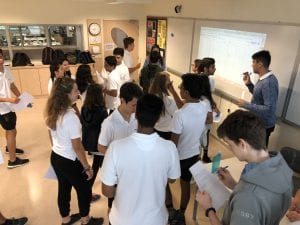“Mathematics is the music of reason”
I believe that this quote by mathematician James Joseph Sylvester cleverly puts the essence of mathematics into words. A large part of mathematics revolves around studying and understanding abstract concepts through logical reasoning, using “axioms” or truths that we accept that are more certain than not. This is just one of the ideas that make up the mathematical method, an idea that helps us better understand what mathematics is.
The mathematical method differs from the scientific method, unlike the scientific method which is largely based upon practicality, the mathematical method is almost completely composed of theory. The scientific method involves the systematic approach of observation, measurement, and experimentation to lead to the development of a hypothesis. The mathematical method, however, requires established theorems or “axioms” that we accept as the truth before further exploration is conducted. There is often also a theorem or endpoint to be established and an infinite number of ways to reach that conclusion, some more effective than others but all leading to the same conclusion in the end.
Conclusions drawn from the mathematical method can also be seen as more absolute than those created by the scientific method depending on the perspective taken. As the mathematical method is based upon axioms, truths that we accept, we can be quite sure of the certainty of the method used to reach the conclusion, as the axioms the theorem is based upon are true therefore the theorem will certainly be true to an extent. The scientific method, on the other hand, involves practical work and physical observation, both of which are susceptible to errors and mistruths.
Conversely, the mathematical method can be seen as less absolute because it lacks the practical work involved in the scientific method. As theorems based on axioms in mathematics are still almost completely theoretical, it is justifiable to say that we are completely uncertain of the truth of a theorem. The scientific method involves practically, people applying the ideas and testing them under various circumstances to do the best they can to falsify it, resulting in a theorem that has gone through extensive testing and changes.
Both the mathematical method and the scientific method work together in helping us understand why things work the way they do. Without mathematics science would not be as organized or work as efficiently, mathematics helps us understand why the things in science work the way they do, which is why there are benefits and limitations for both the mathematical and scientific methods. The mathematical and scientific methods are different in the system and approach they use to solve problems, however, their aims are similar in that they both help us construct theorems and better understand the nature of the universe.



